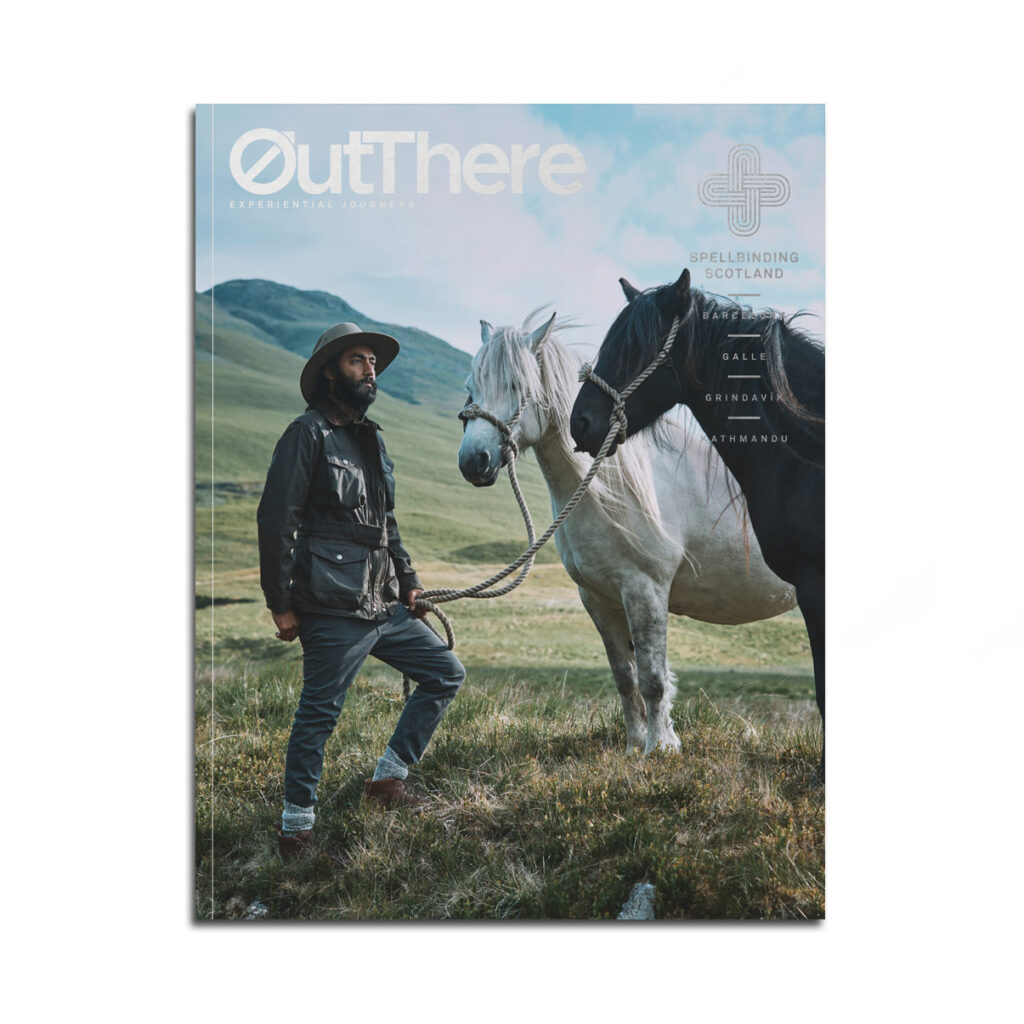In the heart of a private island retreat in Southern Province, Sri Lanka, stands an ancient cashew tree, rooted deep, with the rivers and canals of an entire coconut plantation flowing around it. Such is the inspiration it provided for the creators of this eco-resort, Kaju Green, it became a symbol of their profound belief in the health-giving powers of nature, and the environment they designed around it is – to put it in a nutshell – the perfect place to relax, de-stress and rejuvenate.
As OutThere people, we thrive in cities. These highly populated, diverse and complex urban landscapes are where most of us flourish and prosper, where we feel safest, where many of us find hope, love and community. Yet, in terms of the long history of humankind, the concrete jungles that we call home are a relatively new and unnatural habitat.
We are descendants of a species that has for the longest time existed as nomadic hunter-gatherers, immersed in their natural environment and reliant on their deep connection to nature for their very survival. It’s no wonder then that there is something in all of us that has a desire to travel and be on the move and, for the most part, we consciously and subconsciously seek out situations where we can feel that emotional affinity with the natural environment and reconnect with nature at its wildest.
In today’s world, where our socio-economic framework is developed with a perspective that removes us from our natural ecologies, we are led to believe that nature exists to serve our needs – for agriculture, building materials and, specifically in our case, tourism. When we travel, we search out things that are missing in our everyday lives – endemic birdsong, water sources and fresh air. Even those of us who live outside cities are increasingly affected by a technologically mediated world, so much so that we pay far less attention to all that is around us and more to what is beeping in our pockets and on a screen a few inches from our faces.

This story first appeared in The Spellbinding Scotland Issue, available in print and digital.
Subscribe today or purchase a back copy via our online shop.
There’s now overwhelming evidence that shows how a connection to nature is linked to mental and physical well-being and subsequently our lifestyle choices. So it’s understandable why we are so keen to interact with it when we travel, especially after this long protracted period when we’ve been struck down – and kept indoors – by the pandemic. We’re hungry – ravenous – for its positive impacts, which include greater openness, creativity, connection, generosity, resilience and, most of all, the endorphins hit our body rewards us with when we are in nature.
As much as my partner and I love our London lives, we also crave the simplicity of natural environments. Our stay at the adults-only Kaju Green eco-resort was all about reconnection – with each other, with our spirituality, but most importantly with nature. That was easy, thanks to the blissful sense of serenity created by the 350 or so coconut trees in this sustainable resort in storied Sri Lanka. It’s set on an exclusive inland island next to the country’s renowned Eluwila bird and wildlife sanctuary, yet is just a 20-minute drive from the city of Galle and its many attractions.
In the local Sinhalese language, kaju is the name for the cashew tree. The mighty example in the middle of this coconut plantation is, the eco-resort’s owners believe, the power source of the island, its canals, rivers, flora and fauna. The tree has become a metaphor for how vital a deep connection to nature is in the process of our rejuvenation.
Kaju Green is teeming with wildlife. Each day, from the moment we woke to the last embers of our waking hour, we were treated to an ever-changing symphony from the vibrant jungle life that surrounded us. Birds danced among the trees on the banks of the river that snakes around the grounds, showing off their vibrant coats to the white-faced monkeys swinging from branch to branch, whooping gleefully as they did so, while reptiles of all sizes, including majestic monitor lizards, roam freely on the ground below. As the light faded, the cacophony of frogs and insects began, dampened by tropical rain, lulling us into the deepest of sleeps.
The resort is home to a cornucopia of tropical fruit trees. We tried our hand at identifying them – papaya and mango we immediately recognised, but our uninitiated eyes needed help to pick out the jackfruit, as well as the many scented herbs and spices such as lemongrass, wild ginger and cinnamon.
With such an abundant natural larder to hand, it’s little surprise that the food at Kaju Green is a vegetarian wet dream. The chef lovingly prepares ‘Sri Lankan mother-style food’, from the grandest of meals to the most delicate home-made biscuits, pancakes, sweets and snacks, curries, salads and refreshing juices that all pay tribute to local ingredients derived from the resort’s surroundings. And the food looked as beautiful as it was delicious and healthy. It left us feeling full but clean, rather than heavy and stuffed, as some of the richer Sri Lankan dishes tend to.
“While the bungalow protected us from all sides, there were parts that were open to the elements. Those not used to barefoot-luxury escapes may find this a little disconcerting, but rest assured (we mean that quite literally) that nothing will come to get you in the night”
But it’s not just the food that reflects the lush ecosystem – the accommodation does, too. Our bungalow – the largest of seven beautiful eco-friendly buildings – was designed to fuse contemporary, modernist aesthetics (and hospitality needs) with traditional, sustainable Sri Lankan construction. It featured cooling polished-concrete floors and sliding doors that provided natural air conditioning (the cool breeze gave us welcome respite from the humidity), with bamboo panels that filtered the light and gave us privacy or access to the environmental eye-candy – the luxuriant views.
While the bungalow protected us from all sides, there were parts that were open to the elements. Those not used to barefoot-luxury escapes may find this a little disconcerting, but rest assured (we mean that quite literally) that nothing will come to get you in the night. Outside, torches of incense are lit each evening to keep the insects singing enthusiastically from the jungle’s chancel. They also heighten the ethereal feel of the place.
As each day turned into night, we took a leisurely soak in an impressive bath. Big enough for two, it was open to the heavens for some sublime sky-gazing. Then we drifted off to sleep in our luxurious bed enveloped inside the protection of a giant mosquito net.
Up at daybreak, we took a quick shower in our wet-room bathroom and were then all set for the morning vinyasa-yoga classes on the rooftop deck above a gorgeous open-air lounge, with a soundtrack of chants wafting through the air from the local temple.
Back at our lodge, the saltwater pool was perfect for a post-yoga swim. For more holistic wellness, Kaju Green’s inside-outside spa offers classic Ayurvedic consultations and de-stressing massages, with nature as your treatment room. But the best therapies we found were our long slow walks through the awe-inspiring landscapes, soaking in all that titillated our senses.
There is no doubt that we left feeling the positive impacts of an escape to nature on our minds and bodies. Perhaps there is some truth in the powers of the kaju tree… More than that, we came to appreciate that nature is far from just a material resource – it is our very being. It heals, delights and enthrals and is a pathway to the health and happiness we are all so desperately looking for.
Photography by Martin Perry and courtesy of Kaju Green























